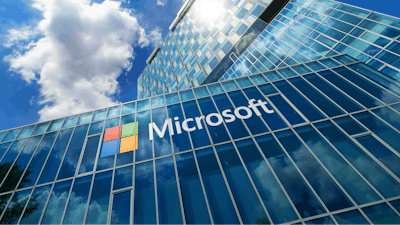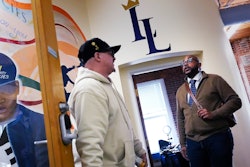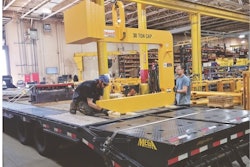
Microsoft yesterday unveiled a broad investment package designed to make Southeast Wisconsin a hub for AI-powered economic activity, innovation and job creation.
The investments include $3.3 billion in cloud computing and AI infrastructure, the first manufacturing-focused AI co-innovation lab in the U.S., and an AI skilling initiative to train more than 100,000 residents with essential AI skills.
President Joe Biden joined Microsoft President Brad Smith at Gateway Technical College to announce the new investment.
Most Read on IEN:
- How the De Minimis Loophole Has Crippled Industries
- Toxic Ingredients Found in Weight Loss Supplements
- Heineken Uproots Huge Apple Orchard as Cider Sales Slip
- Raccoon Knocks Out Electricity for Thousands in Wisconsin
In a statement, Smith said Wisconsin has a rich manufacturing legacy of innovation and ingenuity. Now, he wants to use AI to help advance the next generation of manufacturing companies, skills and jobs. "This is what a big company can do to build a strong foundation for every medium, small and startup company and nonprofit everywhere," Smith added.
Microsoft will roll out the investments in a four-part strategy. First, the company will invest $3.3 billion by the end of 2026 to expand national cloud and AI infrastructure capacity by developing a state-of-the-art data center campus in Mount Pleasant, Wisconsin.
Mount Pleasant was the site of the much-ballyhooed Foxconn project that never came to fruition in the state. While the company does have a small footprint in the state, it's a fraction of the initial promise to invest $10 billion and create 13,000 jobs.
Microsoft's project should bring 2,300 union construction jobs to the area by 2025 and provide long-term employment opportunities over the next several years. The new infrastructure will help companies in Wisconsin and across the country develop, deploy and use advanced cloud services and AI applications to grow, modernize and improve products and enterprises.
Microsoft has partnered with National Grid to build a new 250-megawatt solar project in Wisconsin that will begin operating in 2027. The additional solar power means that by 2027, Microsoft will exceed 4,000 megawatts of power flowing into the local grid, enough to power more than 3 million homes. Microsoft and National Grid will also jointly contribute $20 million over the term of the agreement to a community fund to support under-resourced communities and communities disproportionately impacted by pollution.
The new data center will use recycled water via a closed-loop cooling system that does not require additional water after startup. This is a major step towards sustainability and responsible resource management. A relatively small portion of the facility will use water for cooling, but only when the temperature outside is very warm.
Along with building a physical data center, Microsoft will partner with Gateway Technical College to build a Data Center Academy to train and certify more than 1,000 students in five years to work in the new data center and IT sector jobs created in the area.
Governor Tony Evers said, "This is a watershed moment for Wisconsin and a critical part of our work to build a 21st-century workforce and economy in the Badger State. Evers said, "Microsoft is a blue-chip corporation that recognizes the strength of Wisconsin's workers, infrastructure, economy and our quality of life."
In the second phase, Microsoft will build a manufacturing-focused AI Co-Innovation Lab on the University of Wisconsin-Milwaukee campus. It will be the first of its kind in the U.S. The lab will connect Wisconsin manufacturers and other companies with Microsoft's AI experts and developers to design and prototype AI and cloud solutions to improve and accelerate their work and grow their business. The lab will aim to serve 270 Wisconsin companies by 2030, including 135 manufacturing businesses.
The third phase will see Microsoft partner with United Way Wisconsin, United Way Racine and other community partners to upskill more than 100,000 people across Wisconsin on generative AI by 2030. The curriculum will help train residents to use new applications, including Microsoft Copilot, a suite of Microsoft AI services that enhance productivity and creativity.
Microsoft will also work with Gateway Technical College to train and certify 3,000 additional AI software developers and provide opportunities for 1,000 local business, civic and government leaders to participate in immersive boot camps to learn how to adopt generative AI into their organizations effectively.
Finally, Microsoft will invest in long-term local education and youth employment programs. In partnership with the Racine Unified School District (RUSD), Microsoft will work with Girls in STEM to expand its program to two additional RUSD middle schools. The expansion will provide more than 500 middle school-aged girls access to STEM education over the next five years.
Working with Racine County, Microsoft will support their Summer Youth Employment Program, matching at least 125 young people (16-18 years old) with local employers to receive soft skills and on-the-job training annually.
Microsoft will also continue distributing Equity Through Technology and STEAM Grant Funds to the more than 12,000 people across Racine County engaged in United Way programs. Announced in 2023, these grants help local nonprofits address disparities and support under-resourced communities through technology.
Click here to subscribe to our daily newsletter featuring breaking manufacturing industry news.






















